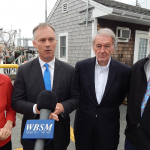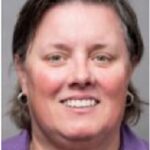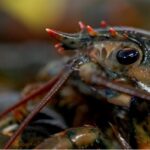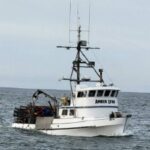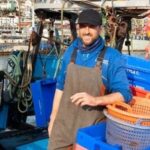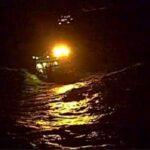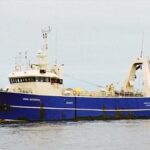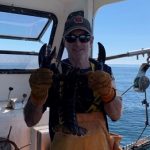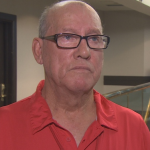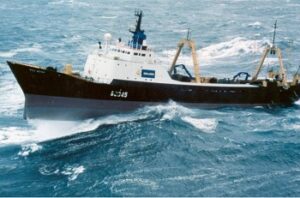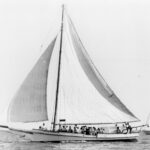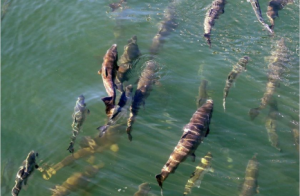Tag Archives: Ellen Goethel
Lobster’s nightmare: Vicious Atlantic wolffish is one scary catch in the Gulf of Maine
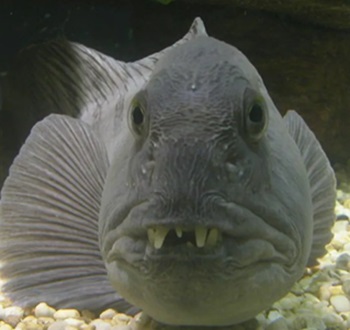 Atlantic wolffish are vicious looking. Their head is huge with gaping teeth that protrude from their lips both top and bottom, giving them a severe overbite. Their tail is tapered with long dorsal and anal fins, which give it a look of an eel. Beware to anyone trying to get a hook out of their mouth! These fish enjoy cold water and can be found throughout the Gulf of Maine to Labrador and down to the Great South Channel of Georges Bank in New England. Amazingly, they can survive in some of the coldest water by producing “antifreeze” proteins stored in their blood and livers. This keeps their blood from freezing under extreme conditions. Around age 5-6, they reach maturity and begin mating. It appears that wolffish are solitary animals except during the mating season, according to NOAA, which occurs in the Gulf of Maine during the fall. The wolffish find mates and remain together until the female lays her eggs. Lobsters beware! The teeth of the wolffish allow them to eat and crush almost anything they want, and what they want are lobsters. They have several rows of very sharp teeth. My husband, always a biologist, when he was fishing commercially regularly dissected the fish he caught to see what they had been eating. Twenty years ago, he opened a 20-pound wolffish and found 21 lobster tails and more body parts in its stomach! more, >>CLICK TO READ<< 14:20
Atlantic wolffish are vicious looking. Their head is huge with gaping teeth that protrude from their lips both top and bottom, giving them a severe overbite. Their tail is tapered with long dorsal and anal fins, which give it a look of an eel. Beware to anyone trying to get a hook out of their mouth! These fish enjoy cold water and can be found throughout the Gulf of Maine to Labrador and down to the Great South Channel of Georges Bank in New England. Amazingly, they can survive in some of the coldest water by producing “antifreeze” proteins stored in their blood and livers. This keeps their blood from freezing under extreme conditions. Around age 5-6, they reach maturity and begin mating. It appears that wolffish are solitary animals except during the mating season, according to NOAA, which occurs in the Gulf of Maine during the fall. The wolffish find mates and remain together until the female lays her eggs. Lobsters beware! The teeth of the wolffish allow them to eat and crush almost anything they want, and what they want are lobsters. They have several rows of very sharp teeth. My husband, always a biologist, when he was fishing commercially regularly dissected the fish he caught to see what they had been eating. Twenty years ago, he opened a 20-pound wolffish and found 21 lobster tails and more body parts in its stomach! more, >>CLICK TO READ<< 14:20
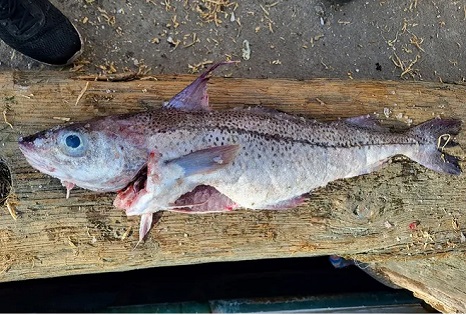
Coddock? Sea sleuths work to uncover mystery of new cod-haddock-like fish
Last summer, I wrote about a very interesting fish, showing up in the Gulf of Maine and promised an update. Well, here it is. We nicknamed it a “coddock” due to its strange shape and coloration. It has the head of a haddock, the lateral line of a cod, the pectoral fin of a cod, and the meat flaked in large pieces like cod. The body shape is that of haddock, and all the other fins look like haddock fins, but it was missing the “thumbprint of God,” which is a large black spot just behind the operculum (gill plates) and above the pectoral (side fin). It also had spotted skin that looked more like a cod than the silvery skin of a haddock. This was abnormal and deserved some investigation. more, >>CLICK TO READ<< 06:37
David and Ellen Goethel talk with Roger Wood About Their Favorite Subjects
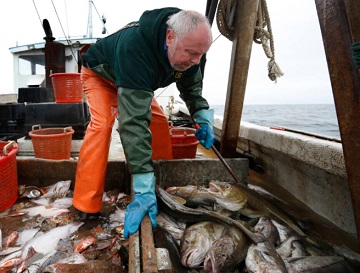 David Goethel of Hampton may have retired from commercial fishing, but he’s still on the water on a regular basis. Ellen Goethel, his wife and partner can’t stop teaching about and researching the ocean and its creatures. Together they form a formidable duo in life and in science. David survived a bout with cancer, and while recovering wrote a book. Endangered Species is about his life on the water, his favorite place. But it’s also about the losing battle that those who still go down to the sea in ships have been facing when the rules go against them at a time when scientists are declaring that overfishing has put the species at risk, especially in the productive Gulf of Maine. In this podcast, Roger Wood speaks to both of them, learning about David’s newly published book and their shared passion, the sea. >>click to read/listen<< 08:17
David Goethel of Hampton may have retired from commercial fishing, but he’s still on the water on a regular basis. Ellen Goethel, his wife and partner can’t stop teaching about and researching the ocean and its creatures. Together they form a formidable duo in life and in science. David survived a bout with cancer, and while recovering wrote a book. Endangered Species is about his life on the water, his favorite place. But it’s also about the losing battle that those who still go down to the sea in ships have been facing when the rules go against them at a time when scientists are declaring that overfishing has put the species at risk, especially in the productive Gulf of Maine. In this podcast, Roger Wood speaks to both of them, learning about David’s newly published book and their shared passion, the sea. >>click to read/listen<< 08:17
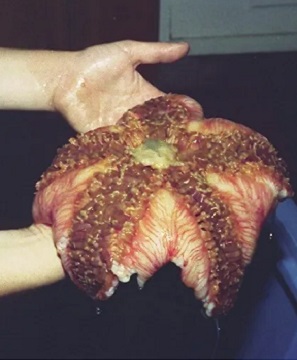
How I met a slime star: A rare and slimy encounter in the Gulf of Maine
Back in 1993, a friend called and asked me about an article he had read in the June issue of the National Geographic about a weird animal called a slime star. He wanted to know if I had ever seen one and if they are found in New England. I told him I had never seen one and that I believed they are found in the Pacific, not the Atlantic. Less than a month later, I was proved wrong! My husband had been fishing on his stern trawler in about 420 feet of water near the “Curl” on Jeffreys Ledge in the Gulf of Maine. He called me and told me he had something odd in his lobster tank. I asked him to describe it to me. He said that it was giving off gallons and gallons of mucus. Photos, >click to read< 12:08

Coddock? How a new cod-haddock-like fish caught the attention of scientists
A strange thing occurred during the winter of 2022-23 and into this spring. An odd-looking fish has cropped up off and on mixed in with the haddock brought into Gulf of Maine ports. This was recently brought to my attention by Linda Hunt, who is a fish dealer for Coastline Seafood. Recently while filleting a load of haddock for the market, she found five fish that she couldn’t quite identify. She had seen a few during the winter and one the day before but finding five in 200 pounds of fish all at once seemed odd. She contacted us with a photo. Wow, what is this fish? It has the head of a haddock, the lateral line of a cod, the pectoral fin of a cod, and the meat flaked in large pieces like cod. The body shape is that of a haddock and all the other fins look like haddock fins. But it was missing the “thumbprint of God,”,,, >click to read< 07:40
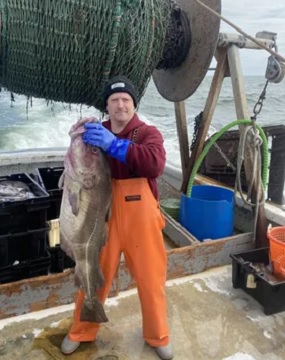
Doomed to Extinction? Where have all the codfish in the Gulf of Maine gone?!!
The commercial fishermen have all been given a personal quota for cod. If they reach their quota, they need to purchase or lease more quota from someone who has extra. The price to “lease” these fish in order to catch them can be exorbitant. Cod has become a commodity on the market being bought or hoarded by non-fishermen to make money off the backs of the active fishermen,,, And then there are the seals. Yes, harbor seals, gray seals and harp seals. Seals would not normally be feeding on large amounts of cod, but we have protected the seal population for decades without regard to the rest of the environment. The result is unmistakably a huge explosion in the seal population within the Gulf of Maine. So, are the cod doomed to extinction? >click to read< 07:50
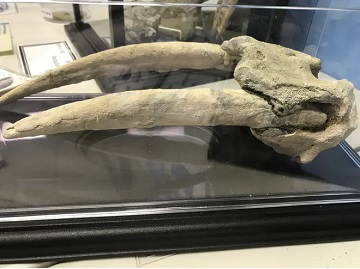
New Hampshire: Skull of extinct Atlantic walrus on display at Explore the Ocean World Oceanarium
Tom Testaverde was fishing his stern trawler, the fishing vessel, F/V Midnight Sun, in about 50 fathoms (300 feet) of water along Race Point off Provincetown, Massachusetts, in the Gulf of Maine. He hauled in the “bag” of fish, concentrating on the catch and the species as the bag opened and spilled onto the deck, when he saw what looked like a middle finger sticking out of the mesh between the fish.,, The skull resided in his garage for many years, but is now on loan to the Oceanarium. Seeing the tusks in person is a real treat and one I love to share with visitors.,,, Many thanks to Tom and the crew of the Midnight Sun for the generous loan of this great piece of natural history. >click to read< 12:22
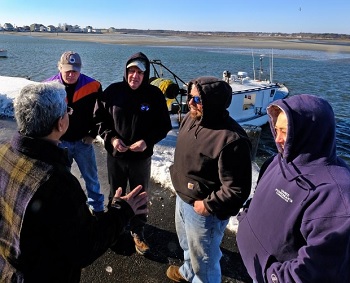
Seabrook: New Hampshire Fishermen deserve voice in offshore wind plans
Selectmen are abandoning a task force looking at offshore wind turbines in the Gulf of Maine, demanding their local fishermen have more direct inclusion.,, Fishing communities like in Seabrook have expressed strong concerns about the turbines’ impact on the ocean and the fish they harvest for a living.,, They said in their letter to the OSI they wanted fishermen to have a direct seat on the task force, which is comprised of elected officials from New Hampshire, Massachusetts and Maine. >click to read< 18:08
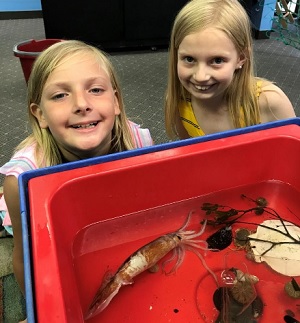
Scallops and squid: Sea creatures with a lot in common
What do a scallop and squid have in common? Well lots, they are both mollusks along with clams and octopus. The squid and scallop both use “jet propulsion” to swim. They both have eyes developed to see well under water, completely different than the eyes humans have. Now, what is different? Well, the scallop has two shells to protect its body, but that makes the animal very heavy, thus they live on the seabed and open and close their shells quickly to swim away from prey for short distances at a time. Squid, on the other hand, are the faster swimmers. >click to read< By Ellen Goethel, a marine biologist and the owner of the Explore the World Oceanarium at Hampton Beach
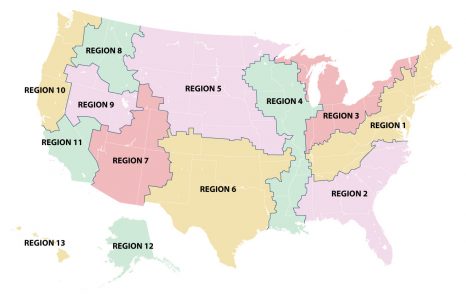
A new push to deregulate America’s oceans and backcountry
Recent decisions at the Interior and Commerce departments are opening the doors for more commercial exploitation of US fisheries and land resources. Advocates say the changes finally allow local voices to be heard. Critics say science is being ignored in favor of industry.,, But while these lands and waters may belong to every American, some feel particularly invested, including the roughnecks, loggers, fishermen, hunters, snowmobilers, and miners who eke out tough livings from rough but beautiful surroundings. Many of them, like New Hampshire boat owner, biologist, and former fishery council member Ellen Goethel, have watched resources grow increasingly off-limits under what she calls a “one-size-fits-all” conservation approach implemented by the Obama administration. >click to read< 11:48
A Response – Speak plain English: Scientists can do a better job talking to fishermen
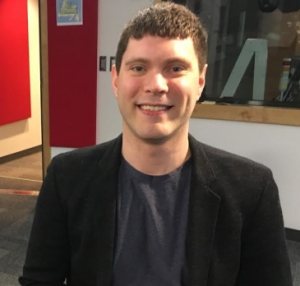 I have just read your recent article by Brett Favaro, director of the Fisheries Sciences at Memorial University’s Fisheries and Marine Institute. “Speak plain English, Scientists can do a better job talking to fishermen, CBC News”. It mirrors what the scientists at the Northeast Science Center at Woodshole have concluded. They are hiring someone to do exactly that, translate between the scientists and the fishermen. I can’t believe that so many brilliant scientists could be so very “intellectually challenged” and arrogant.
I have just read your recent article by Brett Favaro, director of the Fisheries Sciences at Memorial University’s Fisheries and Marine Institute. “Speak plain English, Scientists can do a better job talking to fishermen, CBC News”. It mirrors what the scientists at the Northeast Science Center at Woodshole have concluded. They are hiring someone to do exactly that, translate between the scientists and the fishermen. I can’t believe that so many brilliant scientists could be so very “intellectually challenged” and arrogant.
I have spent my entire adult life fluctuating between fishing and science. My husband is a full time commercial fisherman and my youngest son is a PhD bio mathematician. They understand each other perfectly well. My son fished with his father from the age of 12. He understands fishing and how to listen and how to explain science.
In my opinion the problem is not that the fishermen do not understand the scientists. It is that the scientists no longer understand fishing. The program that you need to add to the curriculum is a year on the back deck learning the ins and outs of actual fishing. How to garner the best data possible from a working fishing vessel. What we have lost is the ability of the scientist to really listen to the fishermen and value their observations.
We should take a lesson from the renown scientist, Henry Bigelow, who spent most of his working career on the back deck of fishing vessels and paying fishermen for their knowledge. Listening to their observations and carefully cataloging them.
Ellen Goethel
Biologist/Owner Explore the Ocean World,LLC
Hampton, NH USA 19:35
Why is the NMFS calling the New Hampshire obligatory NEFMC seat vacated?
 The state of New Hampshire has been notified by the National Marine Fisheries Service of vacancies for New Hampshire’s obligatory seat and two at-large seats for the New England Fishery Management Council. New Hampshire’s obligatory seat is held by Ellen Goethel, who is completing her first term as a council member. Read the article/notice here. The process of filling council seats requires the governor of each New England state to submit the names of at least three candidates to the U.S. Secretary of Commerce for consideration. The state of New Hampshire uses a public process to recommend individuals for the governor to consider for submission. 22:30
The state of New Hampshire has been notified by the National Marine Fisheries Service of vacancies for New Hampshire’s obligatory seat and two at-large seats for the New England Fishery Management Council. New Hampshire’s obligatory seat is held by Ellen Goethel, who is completing her first term as a council member. Read the article/notice here. The process of filling council seats requires the governor of each New England state to submit the names of at least three candidates to the U.S. Secretary of Commerce for consideration. The state of New Hampshire uses a public process to recommend individuals for the governor to consider for submission. 22:30
Hastily assembled meeting gets New Hampshire Fishermen face to face with NOAA Administrator Sullivan
 While no promises for action were made by the official — Dr. Kathryn Sullivan, administrator of the National Oceanic and Atmospheric Association — those who met with her said they appreciated the hour and a half sit-down she gave them at the Ashworth by the Sea Hotel. “I said (to Sullivan) I felt that I’m very patriotic, I love my country, but I feel my government has completely failed us in New Hampshire and in the fishing industry, and the public process has been non-existent,” said Ellen Goethel, Hampton marine biologist and wife of commercial fisherman David Goethel. Read the rest here 19:01
While no promises for action were made by the official — Dr. Kathryn Sullivan, administrator of the National Oceanic and Atmospheric Association — those who met with her said they appreciated the hour and a half sit-down she gave them at the Ashworth by the Sea Hotel. “I said (to Sullivan) I felt that I’m very patriotic, I love my country, but I feel my government has completely failed us in New Hampshire and in the fishing industry, and the public process has been non-existent,” said Ellen Goethel, Hampton marine biologist and wife of commercial fisherman David Goethel. Read the rest here 19:01
Ellen Goethel has been appointed to represent New Hampshire on the New England Fishery Management Council.
“They know me. They trust me. And they know I’m honest and will do what’s best for the fishery, the fisherman and the state,” she said. continued@seacoastonline
































